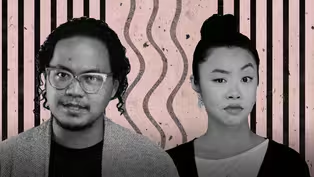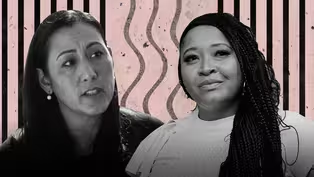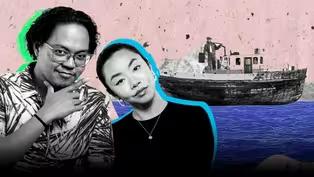
Are You “AAPI” or “Asian American”? It's Complicated.
Season 1 Episode 3 | 11mVideo has Closed Captions
Explore the pros and cons of disaggregating Asian American as a statistical category.
How many A’s in AAPI? Dolly & Adrian hear from South Asian, Southeast Asian, and Pacific Islander voices to explore the pros and cons of disaggregating Asian American as a statistical category.
Problems playing video? | Closed Captioning Feedback
Problems playing video? | Closed Captioning Feedback

Are You “AAPI” or “Asian American”? It's Complicated.
Season 1 Episode 3 | 11mVideo has Closed Captions
How many A’s in AAPI? Dolly & Adrian hear from South Asian, Southeast Asian, and Pacific Islander voices to explore the pros and cons of disaggregating Asian American as a statistical category.
Problems playing video? | Closed Captioning Feedback
How to Watch A People's History
A People's History is available to stream on pbs.org and the free PBS App, available on iPhone, Apple TV, Android TV, Android smartphones, Amazon Fire TV, Amazon Fire Tablet, Roku, Samsung Smart TV, and Vizio.
Providing Support for PBS.org
Learn Moreabout PBS online sponsorshipMore from This Collection
Produced in partnership by the Center for Asian American Media and PBS Digital Studios, A People’s History of Asian America tells the history of Asian Americans through the microaggressions and stereotypes this community faces.
Are Asians Next in Line to be White?
Video has Closed Captions
Unpacking the stereotype that Asians are next in line to be white. (7m 50s)
Where Did The “Asian Fetish” Come From?
Video has Closed Captions
Where does the Asian fetish come from? (7m 40s)
Why “The China Virus” Has Always Been A Part Of U.S. History
Video has Closed Captions
This xenophobic sentiment has resulted in a cycle of violence dating back to the 1800s. (9m)
Providing Support for PBS.org
Learn Moreabout PBS online sponsorshipI think API means Asian American Pacific Islander.
Is that right?
The terms AA and PI got lumped together because of the government?
But it's officially APA.
Right?
Who knows?
Asian Pacific American, which makes no sense.
Ooh, APIDA.
Okay.
Asian, Pacific American, indigenous... Asian Pacific Islander... Oh, Desi American!
Yes.
Yes, yes.
Asian American, um, Native Hawaiian.
Pacific Islander.
Yes.
Come on!
It is AANHPI heritage month officially declared so by president Biden, just in time for May 2021.
Vital communities and very diverse communities within the.
Asian American Hawaiian, excuse me and Native Hawaiian and Pacific Islanders.
Yes.
It is a mouthful and includes a huge range of people who can trace their ancestry to one giant continent of over 40 different countries.
And about 25,000 islands in the Pacific Ocean.
It's a lot.
And the name for this month has changed quite a few times since it was first signed into law by Jimmy Carter, back in 1978.
So this really begs the question who gets to be Asian American?
And why is it so hard for us to find an identity or acronym to share?
Welcome to A People's History of Asian America?
Do I think that the term Asian American includes me?
I -- Yes.
I'm kind of torn with that one.
I feel like it mixes race with like citizenship or nationality.
If I do choose to be a Japanese citizen, does that mean I'm no longer Asian American?
I don't gravitate towards that term first.
I tend to gravitate towards Filipino American first.
Prof, do you consider yourself Asian American, Asian Canadian, Pacific Islander?
I'm actually none of the above.
I'm Ilocano from Toronto.
See, my family and I are from the Philippines.
My mom's side is from a region called Northern Luzon.
So culturally we're called Ilocano people.
Ooh, that's interesting.
But how do you explain that to like most people?
So my easy answer is that I'm Filipino and being from Canada.
We don't really have this concept of Filipino Canadian, the way that y'all have it down here with Filipino American.
That's a pretty crazy concept for me to wrap my mind around.
As someone who grew up with everything being hyphen American.
Why are there no Filipino Canadians?
Well, it has to do with the fact that the US has ethnic studies and Canada doesn't.
First time I heard Asian American.
I, I didn't know whether it was like a white American term.
Put on us or whether it was us kind of being like, Hey, let's form an alliance together.
so people stop killing us and we can actually have unity.
Asian American was actually a chosen term that emerged around the same time that ethnic studies was created as a field.
In 1968, inspired by the Black Power movement, 2 Berkeley students, Yuji Ichioka and Emma Gee coined this term, Asian American.
You know, having an umbrella identity that people could unite under does seem pretty powerful.
So why al this talk of changing it?
Well, maybe we should actually talk about expanding on it.
So as we know, Asian American has its roots in political organizing.
So at its core, it's a political identity.
But as this community grows in numbers and geographical diversity and migration histories, the term starts to fall a little short.
I don't feel that Asian American all the time includes, Southeast Asians or darker Asians.
Asia is a huge country with so many different nations, different nationalities, different cultures.
I do consider Laotian Americans to be a part of, under that umbrella, but as the Lao American, I don't feel I'm as represented.
The term, Asian American or even South Asian has been something that I had never been associated with growing up in Kenya and South Africa.
I think when we are talking about particularly East Asian experiences, that we should identify them as East Asian the same way that we identify South Asian experiences as South Asian.
Another shortcoming is the way statistics get aggregated under the broad term Asian American.
Let's take a look at a very common stereotype that all Asians are crazy rich.
The crazy rich Asian stereotype makes me feel really broke.
I can say with a complete authority that the crazy rich Asians stereotype has never really applied to my lived experience.
Myself as a Pacific Islander feel like I am a wealthy in spiritual, in the spiritual sense though, which, you know, that's special into itself.
On paper it seems like we're doing pretty well economically.
But when you expand on that data, you'll see that the wealth is concentrated amongst select racial groups, mainly Indian, Filipino, Chinese and Japanese Americans.
And when you look at the other end of the spectrum, you'll find Burmese, other Southeast Asian and Pacific Islander communities.
It's important to disaggregate data because we are deemed insignificant and we are deemed too small to be a community on our own as native Hawaiians and Pacific Islanders, or NHPI.
Lao Americans, um, majority of them who came to the U S are refugees.
And it is the impact of American engagement in Vietnam that brought me here to this country.
What the data hides is the fact that many Southeast Asians arrived in the US as refugees.
It also hides the fact that the Pacific islands like Guam, the Mariana islands, and Samoa are still territories of the US which function like colonies.
A little history here is important to know.
Many of these islands were taken through imperial wars.
In 1898 after the Spanish American War, the United States acquired Spain's island colonies in the Treaty of Paris.
After that Guam, the Philippines and Puerto Rico became US colonies.
In that same year, the United States illegally annexed the kingdom of Hawaii.
Which is why, as much of a mouthful as it is, AANHPI is a really important acronym.
The histories of Bative Hawaiians and Pacific Islanders, as well as Filipinos and other Southeast Asians is one that's steeped in war and colonization.
But these histories are often rendered invisible under the label, Asian American.
Let's turn back to you, Adrian, what does it mean to say you're Ilocano from Toronto?
For me, I identify as Ilocano first and foremost because it challenges our assumptions of what being Filipino means.
For that matter, whatever the heck Asian and Asian American mean.
See, it might be easier for me to say Filipino, but the whole point of me telling you about my native land in the Philippines is to make all of us question our assumptions of identity and ancestry.
And most importantly, to remind you that the US has a history of colonization that impacts how I talk about myself too.
And I can see how knowing this history of colonization makes you very weary of things like nationality or neat identity labels.
And as for months like this one -- for me, these commemorations are important, but even more important is sustained curriculum.
Now, going back to what I mentioned earlier about ethnic studies not being taught in Canada, that's one thing that drew me to the US to become an ethnic studies professor.
See it was a pretty radical thing, but in the US this field was created out of activism.
And it was radical to that Asian American identity was first and foremost created as a political identity.
And well, even the name of our show, A People's History of Asian America, it's really about the political identity of this community, which is why it's so important for us to discuss the history, evolution, pros and cons of AANHPI Heritage Month.
I feel like this month, tokenizes my community.
I've never been asked to do so many things.
And I also wonder about where will we be next month?
Do I feel like this month belongs to me?
Like, and my people, no, not really.
Sometimes it just feels a little shallow to me.
And, um, in addition to like black history month, it's like, why do we need to designate a certain box for people of color to exist in?
We don't just want a seat at the table.
We want a voice at the table.
We don't want to be the diversity hire.
You don't want your face paraded out there as the Asian American face.
You want to be the Asian American voice, and you want to be able to bring others up with you.
So I think inclusion, as opposed to representation is to say, we are powerful.
We have a voice, and we want to be a part of the decision-making as well.
I am very hopeful for the future of Asian America, of Native Hawaiian recognition, of Pacific Islander, multiple identities.
When we uplift each other and support each other and connect with each other, and cross-culturally do that.
I feel we rise together.


- Science and Nature

A documentary series capturing the resilient work of female land stewards across the United States.












Support for PBS provided by:




